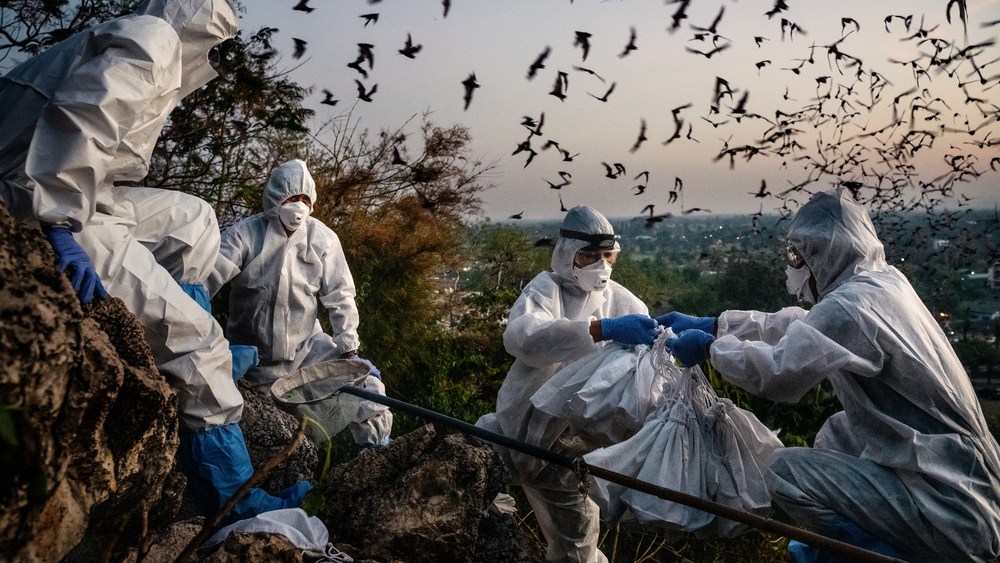COVID Misinformation Doc ‘Blame’ Shows How Scientists Became Targets
While keeping up with news reports in the early days of the COVID-19 pandemic, Oscar-nominated Swiss director Christian Frei began to experience a feeling that “those who warned us would eventually be the ones who are blamed.” This sentiment, which he calls an “epiphany,” is at the heart of “Blame,” which opens Swiss documentary festival Visions du Réel on Friday.
“Blame” follows three scientists who researched the origin of the SARS epidemic that first broke out in China in 2003, Linfa Wang, Zhengli Shi and Peter Daszak. The latter is the former president of EcoHealth Alliance, a nonprofit organization that supported various programs on global health and pandemic prevention, and, in January of this year, was entirely defunded and debarred by the U.S. Department of Health and Human Services following an eight-month investigation on its “failure to adequately monitor the activities of the Wuhan Institute of Virology (WIV).”
Frei’s film begins with the first SARS outbreak in 2003, chronicling how the trio of scientists would come to spend the next two decades trying to stop subsequent pandemics just to be then discredited when disinformation campaigns and fake news on the origins of the COVID-19 pandemic began to spread.
On the sensitivity of the subject of “Blame,” Frei tells Variety he became “much more comfortable” once he decided to approach it as a “classic journalistic story.” “I also wanted it to be told through the empathetic lens of documentary,” he adds. “I wanted to give the subjects room so their voices would be heard but also resist simplification, which is not the easiest from a commercial point of view.”
The director recognizes that resisting simplification often dampens a film’s commercial chances but emphasizes he has a “huge advantage” of not only working in a country with a healthy film funding system that allows for a director to retain creative control of their film but also being a producer, writer, and editor. “I am 100% in control of all my features and am very grateful I’m able to do that.”

Christian Frei (Courtesy of Nina Dick)
On being attracted to controversial subjects such as the ethics of war photography as in his Oscar-nominated 2001 film “War Photography” or space tourism in 2009’s “Space Tourists,” Frei says these are “the tectonics of humanity.” “This is where I will always go. I grew up in a middle-class family and never had any reason to embark from war zones to space, but I am drawn to these stories. What I’m proud of is that my films are getting old in a nice way. They are still timely and valid after 30 years.”
When asked if “Blame” will also retain its timeliness, the director says he believes so as the film is not only about the COVID-19 pandemic but about “how we are all seduced by screaming narratives.”
“The more established media is becoming indistinguishable from the click-baiting internet,” he continues. “I am trying as much as possible to tell a story that might surprise people because what they encounter are real people, not sinister guys plotting in their labs. We often don’t understand what they are doing, that’s true, but they are still human beings. Do they make mistakes? I’m not saying they never do, but still, we should listen to them.”
“Blame” ends with President Trump’s recent appointment of Robert F. Kennedy Jr. as the United States Secretary of Health and Human Services. Kennedy Jr., who authored “Wuhan Cover-Up: How U.S. Health Officials Conspired with the Chinese Military to Hide the Origins of COVID-19,” famously spread conspiracy theories on the pandemic, including a theory that the COVID-19 virus was engineered in Wuhan and spared certain ethnic minorities.
“I was not happy at all that he was finally confirmed but was also not very surprised,” says Frei of RFK Jr.’s appointment. “A majority in Trump’s cabinet understood the dynamic that [former White House chief strategist] Steve Bannon established: uncertainty is not our enemy; it is our friend. This is an opportunity for them. I’m not saying COVID is the only reason, but could Trump have returned to the White House without it? I doubt it.”
The director is also quick to point out how this mindset is not exclusive to the U.S. but is also widely spreading in Europe and across the world. “Far-right parties in Europe are getting stronger and stronger. Is democracy in bad shape? I sometimes feel so, and I feel we need to find a way back to healthily disagreeing. This film does not offer a truth. What I am saying is: let’s try to find our way back to evidence-based worldviews and debates because, in a world where nothing is true anymore, everything becomes possible.”


